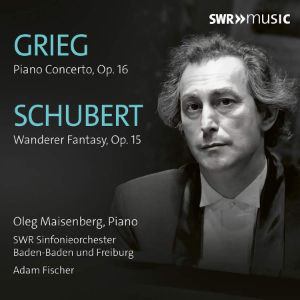
Edvard Grieg (1843–1907)
Piano Concerto in A minor, Op. 16 (1868)
Franz Schubert (1797–1828)
Fantasie in C major, Op. 15, D760 ‘Wanderer Fantasy’ (1822)
Oleg Maisenberg (piano)
SWR Sinfonieorchester Baden-Baden und Freiburg/Ádám Fischer
rec. live, 6 March 1990, Sparkassensaal, Lörrach, Germany (Schubert); 2004, Großer Saal, Konzerthaus, Vienna (Grieg)
SWR Classic SWR19140CD [52]
I have never been very adventurous in my exploration of recordings of Grieg’s piano concerto, sticking with Philippe Entremont and Eugene Ormandy on Sony Essential Classics and Kjell Bäkkelund and Odd Günther-Hegge on the BMG/RCA Classical Navigator label, both bargain classics in analogue sound from the late 1950s – but eminently satisfactory as far as I am concerned. So, for me, the question is, is this digital recording from twenty years ago a marked improvement over my vintage favourites?
The first thing I notice – apart from some slight but negligible hiss in the older recordings – is that while all three take the same time – six minutes – over the gentle Adagio, both my earlier exponents are considerably faster and more animated by a minute and more in the two outer movements. Now, of course, I could by now simply be too accustomed to their greater urgency to be receptive to a more leisurely style, but to my sensibilities, Grieg’s whimsical, mercurial musical style is better served by a similarly light and speedy manner. I always sense Grieg’s humorous, even rebellious, nature in the music of this concerto, despite its lyricism and melodic fecundity, so I like a little edginess in the delivery, a willingness to pull tempi about a bit and indulge fearlessly in rallentandos and accelerandos – which both Entremont and Bäkkelund give me, whereas I find Maisenberg to be more conventionally metronomic.
Furthermore, Entremont, in particular, is so dynamic in his cadenza that he puts Maisenberg completely in the shade; Maisenberg’s reading feels so completely safe and reliable – exactly what I don’t want Grieg to be. However, I would like to put in a word for the sensitivity of Fischer’s accompaniment, even if he hardly succeeds in lighting a fire under his soloist.
I then played all three versions of the lovely Adagio; I thoroughly enjoy Entremont’s bell-like tone and the free abandon of his phrasing, expertly seconded by Ormandy – and he really gets the “attacca” beginning 3:40. Likewise, Bäkkelund and Günther-Hegge unashamedly lean into the voluptuous melodies and instead of providing quite the same vehemence at that same point, generate bass-rich resonance, Bäkkelund slightly the spreading the chords. Maisenberg and Fischer trip through the music in pusillanimous fashion. There is simply no sense of wonder or occasion in their playing; the switch at 3:44 is so weak.
So we move on to the finale, replete with Norwegian “Halling” dance tunes and rhythms. Again, I find myself much more engaged by the verve and rhythmic pointedness of the two older interpreters in the opening and the fast, pounding section half-way through, while their delivery of the concluding maestoso variation on the lyrical second theme is much grander and more imposing.
I chose to compare Maisenberg’s ‘Wanderer” with that by Artur Rubinstein in 1965 for RCA. I don’t know if that is “fair” but I needed a benchmark, as I am not too familiar with the work and that recording is known to be a long-established classic. Of course, as Schubert avowed – “the devil may play it” – anyone who can play the notes is a master pianist but there is simply so much more energy to Rubinstein’s rendition, which you can hear right from the opening, marked “con fuoco”. With Maisenberg, its menace goes for nothing and its progress is essentially dull – and the fact that the live recorded sound is quite recessed does not help – nor does the occasional cough. There so much more soul and poetry to Rubinstein’s Andante and his Scherzo scintillates, while Maisenberg’s flickers neatly. The Allegro finale is so much more emphatic under Rubinstein’s hands; he is far more prepared to employ staccato phrasing and it creates more tension. Perhaps some find Rubinstein’s manner over-stated throughout, but for me the distinction in affect is clear and very much in the older artist’s favour.
I should hesitate to use the word “dull” about so distinguished a pianist as Maisenberg – but there it is. Perhaps there are better recorded testimonies to his prowess; I would not know and can only say that for me this is not a keeper.
Ralph Moore
Help us financially by purchasing from





















